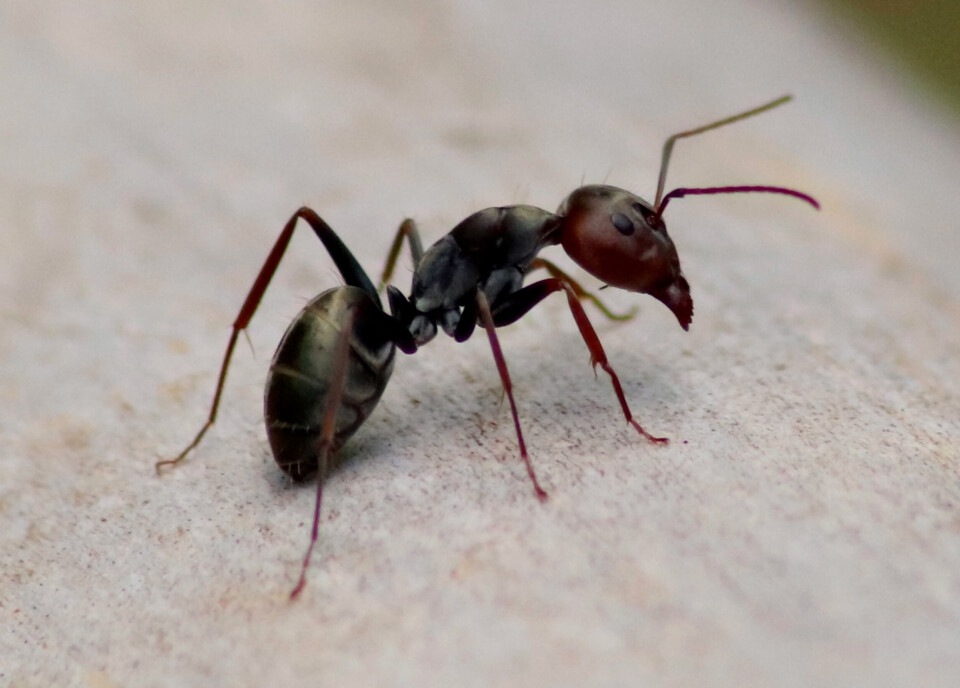-
Travellers risk extra costs under new Eurotunnel ticket rule
Some fare options are less flexible and less forgiving of lateness
-
May will be difficult month for train travel in France, warns minister
Two major train unions are threatening to strike and are ‘not willing to negotiate’, he says
-
Larousse dictionary adds 150 new French words - which ones do you know?
The new words come from trends in sport, nature, leisure, food, medicine, and the rest of the French-speaking world
French scientists train ants to detect cancer with 95% success rate
The hope is that one day the insects will offer an early, non-invasive way to detect tumours

A French team of scientists has trained ants to find cancerous cells, in the hope that the insects will one day be able to help detect tumours. The study found a 95% success rate in the first phase of the test.
Experiential scientist lab at the Laboratoire d’éthologie expérimentale et comparée (LEEC), at the Université Sorbonne Paris Nord (Villetaneuse, Seine-Saint-Denis) trained almost 130 ants to detect the scent of organic volatile compounds (VOCs) emitted by cancer cells.
The ants were kept at 24C, and trained via a rewards system, in the study led by LEEC Professor Patrizia d’Ettorre and CNRS research director Jean-Christophe Sandoz.
The team is hoping that with further study, the ants could be used as a non-invasive way to detect cancer, which is the leading cause of premature death in France.
Scientist Baptiste Piqueret, who also took part in the study, said: “At present, mammograms are done every two years from the age of 50 onwards, but only about 50% of women actually get this screening done.”
However, this method would be “completely non-invasive, with no needles, biopsies, endoscopy or other procedures, and above all, there would be no direct contact between the patients and the ants”.
This is because cancer cells produce volatile compounds (VOCs) that end up in the patient's bloodstream and then in their urine, sweat, saliva, and the air they breathe out. The idea would be to use the patient’s urine or saliva, and have the ants smell it as a first step.
This method would be quicker and less expensive than initial screening, and would then be followed by a full medical examination if the ants detect any issues.
"We could screen much more regularly and earlier, and treat patients more quickly,” said Mr Piqueret.
The results were published in the scientific journal iScience, on February 21.
How were the ants trained?
In the first part of the study, 36 ants were exposed to the smell of cancerous human cells, heated to 37C (like the human body), with sugared water placed next to them. The ants were then allowed to roam until they found the sugared water, using their antenna to detect the reward.
The report said: "In ants, the antennae are the equivalent of the human nose. It will sort of ‘sniff’ its environment and realise that there is a smell next to the reward, and associate the two."
In the second part of the test, the ants were given the smell of cancerous cells, and then non-cancerous smells, and studied to see if they could tell the difference, “depending on their learning capacity and personality of the ants”, the researchers said. This time, the ants did not receive a reward.
Professor d’Ettore said: "We look at where the ant is looking, and the fact that it spends more time looking around the odour that it has learned, proves to us that the learning has been successful.
To verify the results of the study, 50% of the ants were trained to detect cancer while the other half were trained to detect the absence of cancer.
Three types of cancer cells were used; one from ovarian cancer and two from breast tissue (one cancerous, and the other non-cancerous).
Why ants?
Ants were chosen as the insects used in this experiment, as they are much quicker and cheaper to train than, say, dogs, which up until now have also been used to detect cancer cells.
Dogs can take up to a year, and many millions of euros, to train properly in a clinical environment. In contrast, the cost of training the ants is minimal.
Mr Piqueret said: “By using ants as an alternative to dogs, the aim is to reduce the cost and time of training while increasing the number of individuals trained.”
Will it be used to detect real cancer any time soon?
And while the study has so far shown a 95% effectiveness rate in the ants detecting cancer, Mr Piqueret said: “Science takes time”.
Professor d’Ettore admitted: “The cells are grown in a laboratory so it's not necessarily the same complexity of smell as when the tumour grows inside an organism.”
More study will be needed before the work is used, if at all, in medical settings.
It comes as France this year has encouraged the public to take up the three free cancer screening options offered nationally, which cover breast cancer, colon (colorectal) cancer, and cervical cancer.
Similarly, at-home colorectal cancer tests are now available free for eligible people aged 50-74.
Related articles
'Identifying those at risk of cancer before they fall ill is key aim'
World Cancer Day: France encourages three regular cancer screenings
Colorectal cancer tests now available free at home in France
























